
Johann Erhard Kapp (23 March 1696 - 7 February 1756) was a German rhetorician and historian. [1] [2]

Johann Erhard Kapp (23 March 1696 - 7 February 1756) was a German rhetorician and historian. [1] [2]
Johann Erhard Kapp was born in Oberkotzau, a small market town in the hill country between Leipzig and Nuremberg. His father was a carter ("Fuhrmann"). In 1796 he enrolled at the secondary school ("Gymnasium") in Hof, a couple of hours to the north of Oberkotzau. However, according to at least one source he was removed from the school after six months and instead taught privately. [3] In 1714 he moved away from home to study at Leipzig, where he would make his career. [1] Among his more noteworthy teachers, Christian Friedrich Börner (1663-1753) taught him Biblical Exegesis and aspects of Church History. Johann Gottlob Carpzov (1679-1767) introduced him to New Testament scholarship. In an age before university libraries had become mainstream, another Leipzig scholar, Johann Burckhardt Mencke, provided valuable support by allowing Kapp access to his extensive personal library. [4] The denominational context in the Leipzig Theological faculty was by this time one of Lutheran orthodoxy. [4]
Thus prepared, in 1715 Kapp entered Johann Georg Walch's College of Historical Literature, obtaining on 17 February 1718 a Magister degree in Philosophy. He was by now also a member of the College of Practical Exegesis ("collegium exegeticum practicum") headed up by Börner and of the College of Disputation ("collegium disputatiorum") led by Carpzov, following keenly the lectures of both men. [4] On 20 December 1720 he received a Magister Legens ("Habilitation") degree in return for a piece of work on the distribution of indulgences. He was now qualified as a university lecturer. He also took the opportunity to produce journalistic output, producing suitably scholarly critiques of leading academics which were published under the heading "Nova literaria" in the weekly journal "Neue Zeitungen von gelehrten Sachen". [4]
On 14 March 1723 he became an Adjunct professor in the Philosophy faculty. In 1727 he became a fellow ("Kollegiat") of the Great Princely College ("Fürstenkollegium"). In 1727 he was granted an extraordinary professorship in Rhetoric, and on 5 April 1734 a full professorship in it. [5]
In 1735 he was given an additional post as "Programmatist". [3] One of his responsibilities in this role involved producing biographical compilations for deceased members of the university. Kapp also took his share of administrative responsibilities more generally, serving on several occasions as dean of the Philosophy faculty. He also served as university rector on six occasion between 1734 and 1754, always during a summer term. [6]
He died after a long illness at Leipzig on 7 February 1756. [3] By that time he had risen to the position of one of the university's "Decemviri". [4] His extensive library was auctioned in 1758.
Johann Erhard Kapp married Dorothea Sophia Weise (1709-1751) on 8 April 1738. She was a daughter of Christian Weise, the minister at St. Thomas's church in Leipzig, better remembered by subsequent generations as the church where Johann Sebastian Bach was the director of music for more than a quarter of a century. She herself was a God-daughter of Bach's fifth recorded son, Johann Christoph Friedrich Bach (1732-1795).
One child of the marriage was the physician and biologist Christian Erhard Kapp (1739-1824). [7]
Kapp made his name, primarily, with his work on Reformation History, much of which resonates even today. He produced a number of biographical essays on eminent contemporaries which also continue to find readers. When Valentin Ernst Löscher died he took over as producer of the journal "Unschuldige Nachrichten von alten und neuen theologischen Sachen", [8] which he continued to direct till his death. [1] Judged by his academic research work, he was a close follower of Johann Martin Chladenius' Hermeneutic approach.
He joined with Siegmund Friedrich Dresig to conduct a literary disputation against Christian Siegmund Georgi in respect of the latter's New Testament exegesis and criticism. [9]
Johann Heinrich Zedler was a bookseller and publisher. His most important achievement was the creation of a German encyclopedia, the Grosses Universal-Lexicon , the largest and most comprehensive German-language encyclopedia developed in the 18th century.
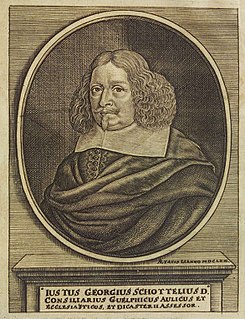
Justus Georg Schottelius was a leading figure of the German Baroque, best known for his publications on German grammar, language theory and poetics.
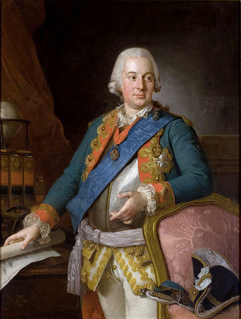
Alois Friedrich von Brühl was a Polish-Saxon diplomat, politician, Freemason, soldier, actor and playwright.

Christian Gottlieb Jöcher was a German academic, librarian and lexicographer.

Johann Octavian Salver (1732–1788) was a German diplomat, archivist, and engraver.

The Paulinerkirche was a church on the Augustusplatz in Leipzig. It was built in 1231 as the Klosterkirche St. Pauli for the Dominican monastery in Leipzig. From the foundation of the University of Leipzig in 1409, it served as the university church. After the Protestant Reformation it was donated to the university and was inaugurated in 1545 by Martin Luther as the Universitätskirche St. Pauli, later also called Unikirche. Johann Sebastian Bach was director of music for "festal" (holiday) services in 1723−25.

Johann Stephan Pütter was a German law lecturer and publicist. He was professor of law at the university of Göttingen from 1746 until his death. He exerted great influence on the law institutions of his time. His principal work is Historical development of the current constitution of the German Empire).

Johann Friedrich Gleditsch was a major book publisher in the late 17th and early 18th centuries.

Maximilian Julius Leopold of Brunswick-Wolfenbüttel, Prince of Brunswick-Wolfenbüttel and nominal Duke of Brunswick and Lüneburg was a Prussian major general and one of the few high officers in the armies of the late European Enlightenment, for whom the subordinate soldier was more than an expendable tool in the hands of the commanding officer. Princely charity towards soldiers and citizens and the circumstances of his death made Leopold famous.
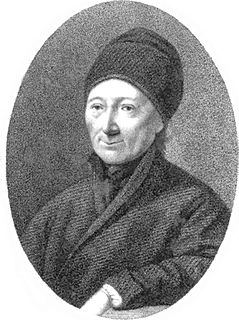
Johann August Nösselt was a German Protestant theologian.

Gottfried Vopelius, was a German Lutheran academic and hymn-writer, mainly active in Leipzig. He was born in Herwigsdorf, now a district of Rosenbach, Oberlausitz, and died in Leipzig at the age of 70.
Johann Gotthelf Lindner was a German university teacher and writer at the time of the eighteenth century Enlightenment.

Johann Friedrich von Recke was a senior public official in the Baltic Germans Duchy of Courland. He is remembered now, primarily, for his activities as an antiquarian and collector.
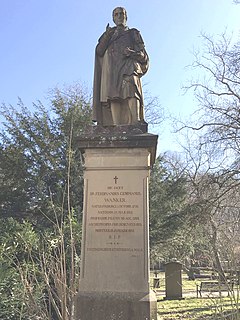
Ferdinand Geminian Wanker was a German Roman Catholic moral theologian.

Johann Siegmund Valentin Popowitsch was a Styrian philologist and natural scientist. His advocacy of a standardized Upper German paved the way for Austrian German as a variety of Standard German.
Christian Siegmund Georgi was an evangelical theologian at Wittenberg in the heart of Germany.

Benedikt Carpzov the Younger was a German criminal lawyer and a witchcraft theoretician who wrote extensively on witch processes. He is considered the founder of the German jurisprudence. He is also known under pen-name Ludovicus de Montesperato.
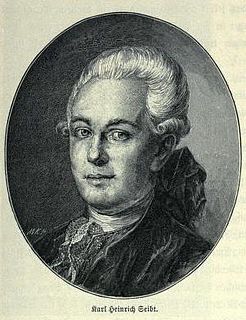
Karl Heinrich Seibt was a pioneering German catholic theologian and teacher.
Christian Johann Christoph Schreiber was a German theologian, philologist, philosopher, and poet. He was also the Superintendent of the dioceses of Lengsfeld and Dermbach. He was connected in friendship or correspondence to writers and philosophers of his time, and published poetry, sermons, historical and philosophical works.